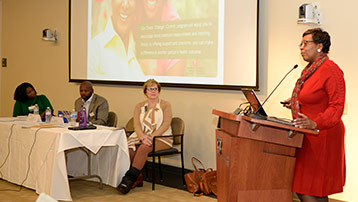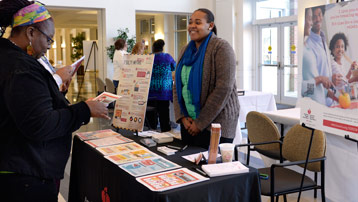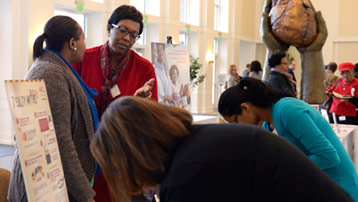Fighting Hypertension in Eastern North Carolina
When it comes to health, geography can be destiny. The zip code where a person lives, works and plays is a strong predictor of life expectancy, better even than considerations like genetics or weight. In North Carolina, people who reside east of I-95 are more likely to drop out of high school, go without health insurance, and live in poverty. They are also more likely to develop hypertension, the number one risk factor for premature death worldwide.

Hypertension -- and the need to take action to prevent, treat, and control it, especially among those most vulnerable -- was the subject of a day-long event held at the East Carolina Heart Institute at East Carolina University on Friday, December 12, 2014.
The Evidence Academy on Hypertension brought together over a hundred researchers, health professionals, and community leaders to discuss ways to address this silent killer, and promote better health for Eastern North Carolinians.
“Evidence is so important,” said Al Richmond, executive director of Community Campus Partnerships for Health. “What we don’t know about hypertension is just as important as what we do know. Where knowledge is lacking, we need to go out and collect evidence to fill in those gaps. Where we do have evidence, we need to act on it and put it into play to improve the lives of people with hypertension.”
Richmond spoke of a commitment to solve this issue through localized and regionalized approaches, noting that people do not have to travel thousands of miles to make a difference when there is plenty of need in their own backyard.

Throughout the day, participants, including clinicians, practitioners, researchers, community leaders, and local officials discussed a broad set of evidence-based approaches to this important issue, always with an eye on their possible impacts on local communities. The schedule included a series of large-group and smaller breakout scientific presentations in policy, treatment, and practice tracks, with extended opportunities for participants to discuss research findings and model programs, as well as a personal account from an individual living with hypertension.
Vickie Brown’s story was heartbreaking. A pastor in Wilson, Brown had suffered from six miscarriages before finding out she was pregnant again, this time with a boy. When her doctor told her the baby was at high risk for complications because of her diabetes and high blood pressure, she realized that she was damaging herself and her unborn child by not keeping her hypertension under control. Sadly, her son was born prematurely and never made it home from the hospital.
After a bout of depression, Brown finally recognized that she couldn’t continue on the same path and resolved to take better care of herself. She keeps a picture of her departed son beside her bed and says it pushes her to get up every day, go for a walk, and eat nutritional foods. Brown expressed the desire to have her experience not just impact her own life but also those around her, and now runs a number of activities in her church to teach members how to live a healthy lifestyle.

Engaging faith-based organizations to promote behavior changes and medication adherence in the community was the subject of one of the later sessions. Others focused on a variety of topics, including health literacy, prevention policies, tobacco use, practice-based research networks, and co-morbid conditions like diabetes and kidney disease.
During the course of the event, an artist named Eleatta Diver created a live painting, commissioned by the American Heart Association as an ethereal way to connect people with different backgrounds and perspectives around a central theme. Depicted on the canvas was a singular active silhouette of an individual with a prominent heart, a surrounding landscape with a line representing the heartbeat, earth colors to embody rural communities, and a background of different colored dots signifying all of the different people involved in promoting better health of the individual. At the end of the meeting, participants were asked to fill out comment cards describing how the painting made them feel and whether they thought it represented what they got from the conference.

Following the Evidence Academy, a small group of 8 to 12 individuals known as the Action Learning Cohort (ALC) will take what was gained from the meeting and collectively identify and develop ways to engage in action to address hypertension from policy, practice, and research perspectives. The effort will be led by Lori Carter-Edwards, Principal Investigator of the Evidence Academy on Hypertension. The ALC group will meet for approximately six months, with the end goal of producing a product such as updated policy recommendations or a new pilot grant, which can then be shared with the wider community.
“My hope is that we can use the synergy and momentum from the Evidence Academy to promote efforts that help improve hypertension prevention and management in Eastern North Carolina,” said Carter-Edwards, who is also Evaluator for the Public Health Leadership Program and a research associate professor of Health Behavior at the UNC Gillings School of Global Public Health.
The event was sponsored by the National Heart, Lung and Blood Institute, a division of the National Institutes of Health, and the NC Translational and Clinical Sciences (NC TraCS) Institute. Additional support came from the American Heart Association/American Stroke Association’s Mid-Atlantic Affiliate, and Vidant Health. Partners included East Carolina University Brody School of Medicine, Eastern Area Health Education Center (EAHEC), the American Heart Association/American Stroke Association, UNC Gillings School of Global Public Health, and the UNC Center for Health Promotion and Disease Prevention.
See also: Forum Focuses on Hypertension
- Created on .